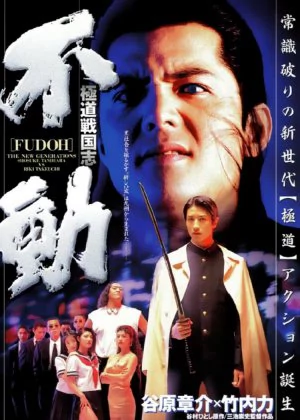Fudoh: The New Generation

Takashi Miike is no doubt one of the more prolific and multitalented directors of contemporary cinema, but for people of my generation (the ones who blossomed during the 90s) the introduction to Miike was probably through his zanier, weirder and more excessive films. Fudoh: The New Generation [Gokudô Sengokushi: Fudô] was one of those early Miike projects that made a splash in the international cult circuit, watching that one for the first time was a real eye-opener for me. I wasn't entirely sure how well the film would hold up after all this time though, so a rewatch was in order.
![screen capture of Fudoh: The New Generation [Gokudô Sengokushi: Fudô]](/thumbs/img/articles/1200xauto/fudoh-1.webp)
There are many sides to Miike and depending on the niches you like to frequent, there are lots of different paths into his oeuvre. But the first people who bumped into Miike's work were no doubt the fans of obscure, over-the-top cult. Though Fudoh isn't exactly the first of its kind (Osaka Tough Guys deserves that credit I think), it's the first one that captured the attention of people outside of Japan. In many ways Fudoh is a pretty typical Yakuza/crime flick, except for all those moments where Miike cranks up the levels of insanity. Something many would come to see this as Miike's signature style, though that doesn't really do justice to his versatility.
It's not a big surprise to see Fudoh was based on a manga. Some of the more outrageous ideas here are very typical of the Japanese manga/anime scene, though they don't always translate well to live action. Unless you have a guy like Miike that is, who doesn't mind a bit of excess and doesn't fear committing to these elements. He takes the premise - a bunch of kids banding together to take on the older generations of Yakuza - and runs with it. I wouldn't say the film is quite realistic or believable, but it's more than entertaining enough to keep such worries from spoiling the enjoyment.
Fudoh is witness to his father murdering his older brother in cold bold, as a way to escape punishment from his bosses. The event has such a huge emotional impact on Fudoh that something snaps inside. Rather than follow in his father's footsteps, he starts his own little Yakuza gang, recruiting from kids in his school and those living on the street. He trains them to do stealth executions, devising a plan to mess with the reigning power dynamics between gangs. They get cocky though, and it's only a matter of time before Fudoh's father finds out about his son's intentions. He calls in the help of his half-brother to bring a stop to Fudoh.
![screen capture of Fudoh: The New Generation [Gokudô Sengokushi: Fudô]](/thumbs/img/articles/1200xauto/fudoh-2.webp)
Visually, Miike's early work tends to be rather raw and unpolished. That doesn't mean he didn't make an effort though. While a film like Fudoh would definitely benefit from a nice HD restoration, it's clear that Miike was already experimenting with camera work and editing to give his films a little extra flair. Fudoh comes off quite lively and dynamic, adding an extra level of cool to characters and grotesque events, effectively making up for the somewhat shoddy effects and lacking image quality. It's far from his nicest looking film, but considering its low-budget roots, it looks surprisingly good.
The soundtrack isn't quite as interesting. It's never been a strong point of Miike, certainly not in his early days. The music itself is pretty generic and doesn't add much to the personality of the film, but Miike does apply it rather skillfully. I don't think many people would be able to identify the music outside the context of the film, even so it does gel well with the visuals and does its part in setting up specific moods. I wouldn't cal it exemplary, but it certainly doesn't work against the film, and it is illustrative of how even a simple, common score could be used to good effect.
There aren't too many familiar faces in the cast, apart from Miike regulars Mickey Curtis and Riki Takeuchi, both in smaller parts. The acting was never going to win the cast any prizes, but it must be said that everyone is fully committed to their part and tries to make the best of it. Someone like Kenji Takano may be a somewhat limited actor, but his character stands out and is incredibly memorable, which is exactly what films like this need. From the assassin kids to the darts-shooting high school girl and the colossal tank, the young Yakuza gang is a fun and inspired bunch.
![screen capture of Fudoh: The New Generation [Gokudô Sengokushi: Fudô]](/thumbs/img/articles/1200xauto/fudoh-3.webp)
Fudoh is a film that bets on individual moments to make a difference. Miike starts off strong, with several head-turning scenes that immediately grab the audience's attention. Once he slows things down to get a little narrative in there, the quality takes a small dip. It's pretty typical for Miike's earlier work, what speaks in Fudoh's favor is that these stand-out moments are plentiful and spread out pretty equally throughout the film. The pacing is solid and Miike makes sure you never go 10 minutes without some kind of crazy detail, right until the very end.
There are few directors who compare to Miike, which is no doubt part of the reason why even his older films still feel fresh and exciting by modern standards. Focusing solely on technical qualities, Fudoh is ripping apart at the seams, but that would mean ignoring all the creativity, joy and sheer disregard for proper taste on display here, so often lacking in more accomplished films and effectively rendering them dull and powerless. In contrast, Fudoh is a breath of fresh air. A crazy, wild and imaginative ride that entertains and baffles from start to finish. Vintage Miike.